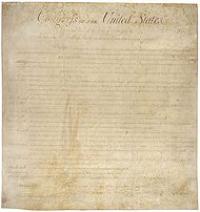|
|
|
The Bill of Rights is the collective name for the first ten amendments to the United States Constitution, which limit the power of the U.S. federal government. These limitations serve to protect the natural rights of liberty and property including freedoms of religion, speech, a free press, free assembly, and free association, as well as the right to keep and bear arms. They were introduced by James Madison to the 1st United States Congress as a series of legislative articles, were adopted by the House of Representatives on August 21, 1789, formally proposed by joint resolution of Congress on September 25, 1789, and came into effect as Constitutional Amendments on December 15, 1791, through the process of ratification by three-fourths of the States. Originally, the Bill of Rights included legal protection for land-owning white men only, excluding African Americans and women. It took additional Constitutional Amendments and numerous Supreme Court cases to extend the same rights to all U.S. citizens. The Bill of Rights plays a key role in American law and government, and remains a vital symbol of the freedoms and culture of the nation. One of the first fourteen copies of the Bill of Rights is on public display at the National Archives in Washington, D.C.. |




 RSS
RSS